Allure Must Be Covered. Individuality Peeks Through
Text and Photographs by RUTH FREMSON
![]() HETHER
they call it "observing purdah" or "hijab," the
meaning is the same: a traditional Muslim woman's obligation to hide her
physical beauty from men to whom she is not related. But there are many
interpretations of what is required among the Afghan refugees now living
in Pakistan.
HETHER
they call it "observing purdah" or "hijab," the
meaning is the same: a traditional Muslim woman's obligation to hide her
physical beauty from men to whom she is not related. But there are many
interpretations of what is required among the Afghan refugees now living
in Pakistan.
When the Taliban took control of Afghanistan, they tried to impose a uniform standard: the head-to-toe covering called the burqa, a swirl of colored fabric that covers everything except a woman's eyes, erasing not just her allure but her individuality.
Aftab Ahmed Butt, who owns three women's clothing shops in Peshawar, Pakistan, summed up the argument for strictness: "Women should wear proper purdah with only their eyes showing. They should wear gloves and socks. Women not wearing purdah are wrong because males will be attracted to them. In your Western clothes your beauty, your dignity, would vanish. Women can wear makeup and Western clothes, but just for her husband."
But in the streets near his shops, Afghan women observe purdah or hijab (Urdu and Farsi words, respectively, that mean "covering") in many ways.
Some keep the burqa while others use a large shawl that they call a chador, wearing it worn over loose clothing. (This is not the chador worn in Iran, which covers a woman completely.) The chadors vary in size, color and the way in which women wrap themselves, depending on the wearer's thoughts about hijab itself.
A few rebel still further. "Purdah was the oppression of the Taliban who forced us to wear these things and I left them behind in Kabul," said a recent arrival. Her blue eyes flashed defiantly from below a small, light, white scarf. But she dared not give her name.
* * *
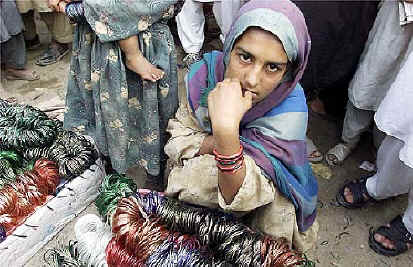
"Every Pakistani woman wears a chador so I am supposed to wear it. I'm working, so I can't afford to wear a burqa. If I did, the mohajirs [refugees] would tease me because the burqa is for "good" women who stay inside the home. I face a lot of hurdles and problems. Men offer me money to go with them for the night."
NOOREEN,
vendor of bracelets in a Peshawar street market.
* * *
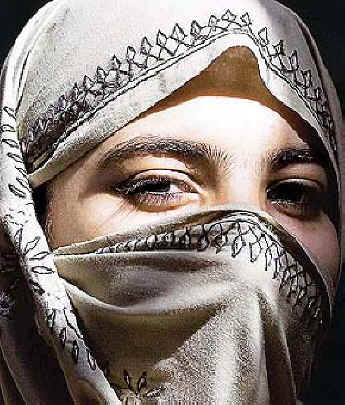
"Because we are Muslims we should have a hijab. Some say only their hair should not be seen, some will wear a veil over their face and some will wear the burqa. It depends on each family how they do it. The disadvantage is the hot weather. I want to be in the house in the summer, where I don't have to wear it, but I think there are more advantages than disadvantages. Islam does not say you MUST wear it. Islam shows you the way and if you agree, you wear it."
LIDA, 16, student of medicine at Afghan University in Peshawar.
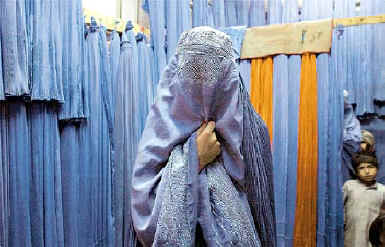
"We are Pashtuns. We don't like the chador. The burqa is half of our faith. It is my religious duty to wear it. The wives of the prophet used to observe purdah. First, I was wearing a chador but when I got married my husband told me to wear the burqa. While you are in Rome do as Romans do."
ZARGHONA,
19, in a full burqa in a shop that sells only burqas.
* * *
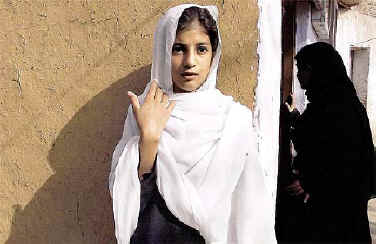
"I like the chador. When I was in Kabul I used to wear it. I was 6 or 7 when I started to wear it. It is quite comfortable and I don't cover my face. Next year, when I am in the seventh class, I will observe hijab. I will feel like a grown-up woman. I have seen Western movies and their clothes are their fashion, but this is an Islamic country, and Islam doesn't allow us to wear such clothes. I think they look very bad."
HALEEMA,
13, a student.
* * *
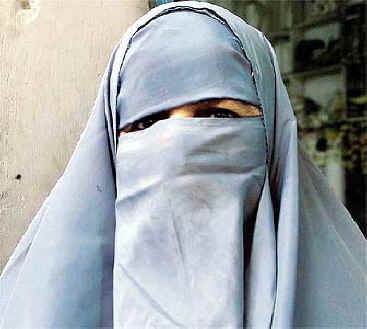
"This is the proper Islamic hijab. I've been wearing it for twenty 20 years. I made it myself. I like this color. It takes two or three hours to make and it costs 300 or 400 rupees [about 5 or 6 dollars]. It is economical to make it myself. It is a sin if you are not covering your face. We have to take care of our modesty. Hiya [modesty] is half of our faith."
ULIYA, 45, in a homemade burqa.
*
* *
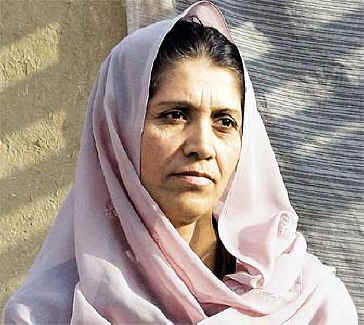
"I won't hide my face. I don't agree with this rigid version of Islam that some people practice. I believe we should adopt the moderate, middle way. I'm not trying to be fashionable, I'm not wearing makeup. So why should people look at me? But if they do, I don't care. I will take my stand. My father-in-law gave me permission to work on the condition that I would hide my face. I told them I respect them but I don't like their way."
RAHEELA, 45, girls' school principal.